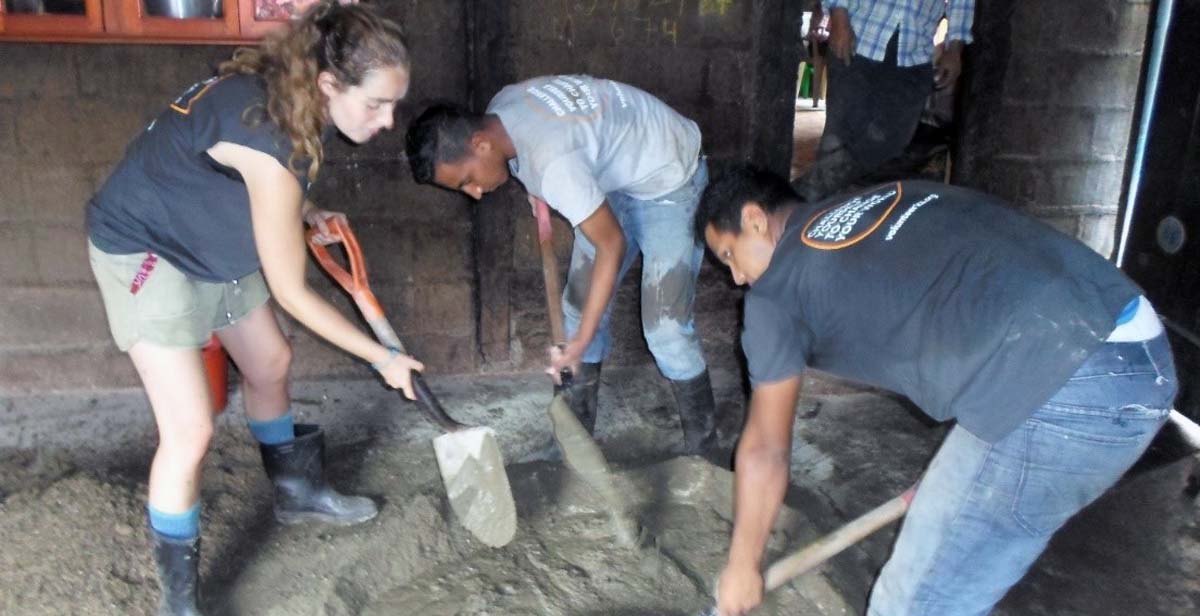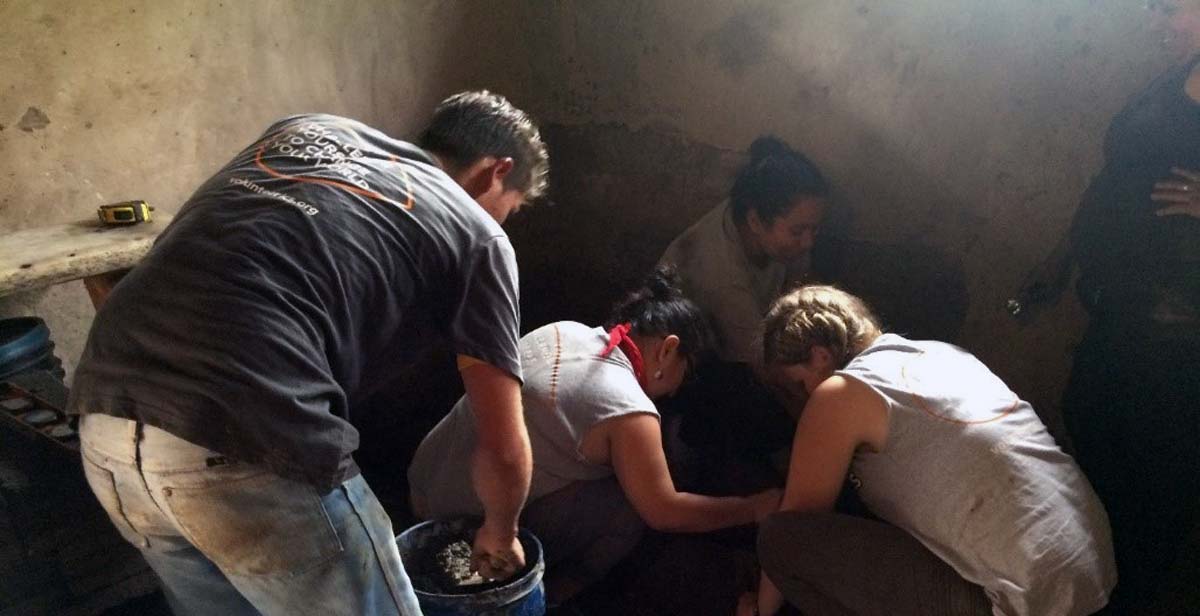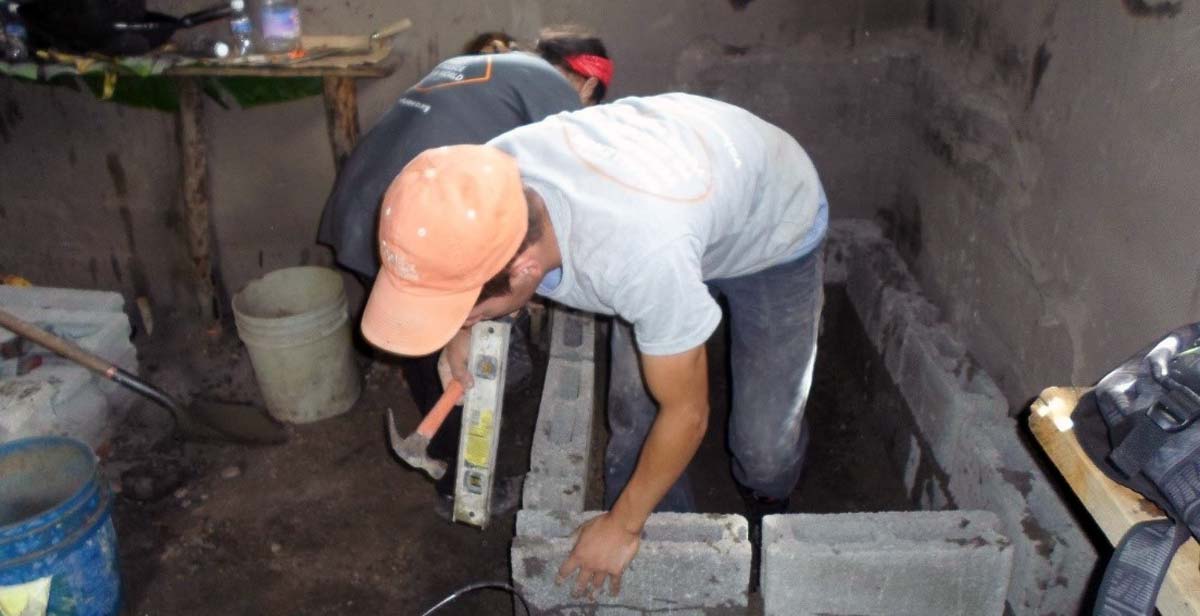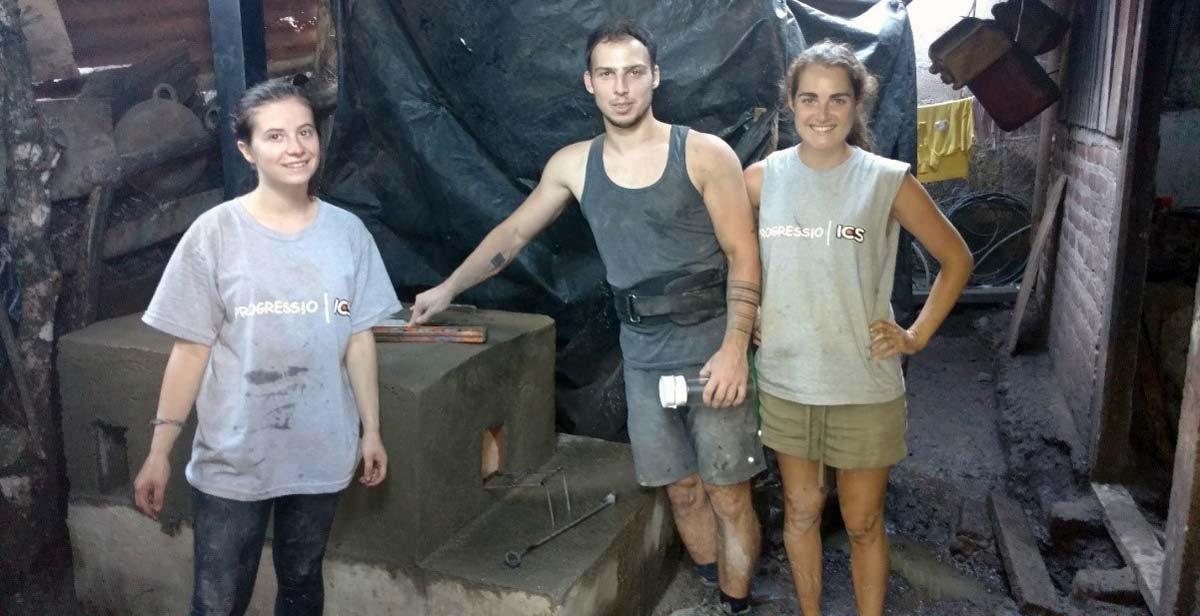The UK and Nicaraguan Progressio ICS volunteers of El Bramadero have now come to the end of doing construction. This consisted of building seventeen eco-stoves and three eco-stoves for beneficiaries in Darayli, one of El Bramadero’s neighbouring villages.
To give you some insight into the work and experiences of the volunteers, I asked them how this part of the programme has worked for them so far, delving into the construction practices, likes and dislikes, skills learnt, challenges encountered, and any stand-out moments and beyond.
The day’s work would begin in El Bramadero, where we loaded ourselves up with tools ready to take a mile’s trek up the long and winding road to Darayli. On behalf of the other volunteers, I can say that this is one of the best ways to prepare for the working day. The walk gets you in gear and the views of the rolling mountains and cloud forest make it a worthwhile, scenic commute. Yeudi, a national volunteer, even commented that “I don’t hate [the walk] anymore”, after seven weeks of placement.
In Darayli, the volunteers would assemble themselves into working groups of four and head to their respective beneficiary families to build an eco-stove or eco-oven. One of the pleasures of visiting different beneficiaries for UK volunteer Rob was seeing the actual living conditions of the homes themselves. During construction, we had the privilege to see the living quarters (the living room and kitchen, veranda and garden), giving the UK volunteers a feel for how members of the community live in their homes. Despite a noticeable difference in material wealth from the house viewings to what we’d see in the UK, the beneficiaries live minimally and practically, with very few or no excesses. With regards to the reason for building eco-stoves and eco-ovens, in a couple of houses, the smoke that had been chucked out of the old kitchen stoves had painted the adjacent walls black with soot. This reinforced the importance of the impact new eco-stoves that require less wood and let out less smoke (almost all of which is funnelled with the addition of the chimney) in improving the health of the beneficiaries and reducing deforestation.

Through doing construction, the volunteers have benefitted through acquisition and development of new skills and knowledge. Whether inexperienced (underqualified or even overqualified) or experienced in construction, all the volunteers have learnt something new. In fact, all of the UK volunteers had little or no experience in construction before coming to El Bramadero. For volunteers Itza, Aimee and Rob, they have learned practical skills of which they had little or no knowledge at all before joining the programme. Rob hadn’t even envisaged properly learning about construction in his life before coming to El Bramadero. On the whole, all the volunteers relished the manual labour involved in construction, particularly due to its novelty for some volunteers. Petar, a UK volunteer, loved “the cement volcano and the danger of it possibly leaking”. No-one minded getting their hands dirty or clothes mucky. Whether it was sieving the sand, mixing the cement, or cutting a block into the desired shape, the variety of tasks involved made it exciting and worthwhile. And the freedom that comes with the work not being healthy-and-safety-mad, such as rules for protective clothing in the UK, is relaxing. Occasionally, although all teams were led by an on-site construction manager, you had to learn on the job, “the frustration of not knowing how to do something without practical guidance… [meant] that you had to learn to trust yourself and hope for the best”, as said by UK volunteer Aimee. We had to remain self-assured. With respect to the specifics, Alice enjoyed learning “how to lay bricks, get the right consistency of the cement, flick cement onto the wall, how to make it stick, and also how to use one of those things called a spoon here” (in Spanish, cuchara, referring to the tool used to spread the cement). Some of these techniques required more mastery than others. From my own perspective, using basic instruments, materials and methods to build the eco-stoves and eco-ovens, gave the final product a raw and artisanal feel to it, and a sense of personal achievement for me at the end of a shift. Certainly, being part of the progression of seeing an eco-stove or eco-oven take shape through a collective of individual methods within a team is rewarding and inspiring. As Rob said, “starting with a blank canvas and by the end of the day, you have a physical representation of the day’s work…and its potential use and impact is clear”. In all of this, for Leynar, a national volunteer, his experience of construction developed his aspirations to work in the construction industry. It is widely agreed, especially amongst the UK volunteers, that he shows a level of determination and industriousness that surpassed every other member of the volunteers, and therefore thoroughly deserves to go on to do well in this field.

Construction was not without its challenges though. Cutting bricks down to size with a blunt saw proved demanding for the UK volunteers, though somehow, the national volunteers managed this feat over and over again. Perhaps this was down to their practical-orientated selves through their upbringing. So, quite often we found ourselves having to exercise some good old resilience. At other times, when we found ourselves short of tools due to their sparse distribution between teams, we were encouraged to be more inventive with our minds.
With regards to communication, the language barrier didn’t only present itself and its associated difficulties between the national and UK volunteers. As UK volunteer Rob remarked, one setback occurred when one team was “told [by the beneficiary family that] we’d built the eco-stove the wrong way around and having to do it all over again”. As is life. Having said that, the language barrier between national and UK volunteers, particularly during the first couple of weeks of construction, did not seem to affect the team dynamics that much. Rob found out that “when speaking to people in a different language, how little you need to know in order to work well together”, and Alice went a step further saying, “[you] could do the entire thing in silence and it would be fine”. Ongoing learning and bodily gestures were important within the teams. The improvement in Spanish and English language exchange helped greatly too.

Construction was not solely about construction, about the physical impact made as a mark of our work here, but also to do with the quality of working and living relationships that has developed between the volunteers, their personal development, and the cultural exchange. Indeed, Progressio ICS has given the UK volunteers the unique opportunity to work side-by-side with Nicaraguan volunteers on the other side of the world. This may sound ludicrous to some people but it has already had many positive outcomes. It has fostered great camaraderie between a set of volunteers previously unknown to each other, being it a particularly unique relationship as we all live and work in practically in the same two neighbouring villages. For personal development, undeniably the qualities and values of cooperation and communication flourished among all volunteers. Finally, there have been a multitude of cultural exchanges that have taken place as we’ve gone on in the cycle both on conscious and unconscious levels. For example, on a more perceptive level, the sheer speed of some of the national volunteers’ building skills against that of the UK volunteers was incredible, as was with their tendency to work hard in silence compared with the UK volunteers’ urge to chat as we go along (but somehow without a cup of builders’ tea and a biccy on the side, since coffee is the custom here in Nicaragua). Other observations included how many beneficiary families would offer their help with the construction (no matter their sex, age, or occupation) or who were just content with watching it happen.
These moments made construction very special for us. And with construction, there was something for everyone to get involved with or take away from it. We as UK volunteers hope to take these back to the UK and make a difference there, as do we wish for the national volunteers to continue to make a difference in their community in Nicaragua in whatever shape or form.
Written by ICS volunteer Theo Briffa



